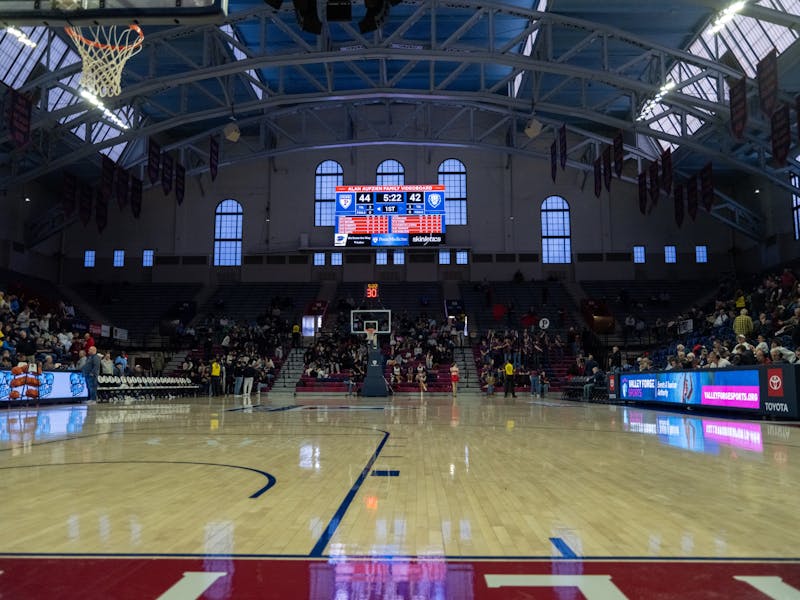An illuminated, gilded statue of the notorious Vladimir Lenin towers over a region called V.D.N.Kh in northern Moscow, while the stores surrounding the statue are alive with customers browsing through Apple PowerBooks and Casio digital watches. Small kiosks in the below-ground crosswalks sell bottles of Finnish shower gel for 50 rubles a pop, while many Russians' monthly salaries are pensions that barely exceed 30 rubles -- if the Russians even receive salaries at all, that is. Handsome men in Italian suits and suede shoes run their fingers through their gelled hair and chat loudly on cellular phones, as they step over beggars who hold up hands stained by dirt, frost and calamity. BMWs and Mercedes with tinted windows race past each other on the highways. Occasionally one stops at a roadside fruit stand and a man surrounded by bodyguards and weapons walks away with a crate of oranges. He doesn't have to pay. The fruit vendor, an aged woman of 65, will not stop him. She cannot stop him. The handsome statue of KGB founder Felix Dzerzhinsky no longer stands in its longtime location on Lubyanka Square, but the KGB and secret service still operate using different aliases, and their presence here is still very real. The Kremlin itself, trying to coerce the nation into adhering to Western practices and free market capitalism, takes two steps back each time it makes a step forward. The Parliament is still run by Communist leaders who are innately supportive of Stalin and blind to his purges, leaders who are at their core both anti-American and anti-Semitic, leaders who kill democrats for their cause. And no other leader but Boris Yeltsin in 1991 has ever seemed so promising, so triumphant in a time of evolution and post-Communist change. But Yeltsin, like other Russian leaders, became paralyzed by his own vanity, his reluctance to uncurl the fingers of an iron fist. Because of his own reticence, his need to do things his way, he brought the army to Chechnya, where 80,000 people -- working to recreate their nation -- fell at his hands. Standing strong before the White House, Russia's Parliament building, in 1991, Yeltsin himself appeared vibrant, ready and above all, capable of bringing a baby -- the new Russia -- into a world so shaped by the former Soviet Union. But now, after multiple heart attacks, quintuple bypass surgery, alcoholism and foolish errors like Chechnya and his attack on the White House in '93, Yeltsin's own story is a staggering irony. As a result, Russia has slipped into the greedy hands of the notorious oligarchs who control her with their wallets. Russia is clearly a nation in transition, but her movement from one era to the next extends far beyond its physical manifestation. Behind the beggar, the BMW owner, the man still clinging to Communism for support, is the Russian soul, an entity so tarnished by its past and already so weary from what appears to be its future. The Russian himself looks at 1998 and sees himself trapped between two worlds: a 75-year-old past cloaked in the red veneer of power and security, and an infantile future, replete with economic shock and turbulent politics. Should he walk backwards or forward? Any move he makes will land him in the international limelight, and each choice is harder than the next. His past has not ended, his future not yet begun, but his present is dashing in and out of both unknown worlds. The Russian people, from the young children who sport Chicago Bulls caps to the elderly pensioners, are faced with the unthinkable task: to build a new nation, to make a pile of rubble into a palace. But with the imperial epoch long gone, Communism supposedly squashed and a semi-democracy causing more pain than anything else, the Russians do not know where to turn. Despite their errors, their history is an amazing story of repression and survival, and the fact that they have survived at all is both astonishing and magnificent. To live in Russia at the turn of the millennium is to just barely see the light at the end of a long tunnel, to wonder if hope is there and to struggle mercilessly to attain it. To live in Russia now is to wonder who you are, who your allies are, what you believe in and to watch your back. Sandwiched in between communism and democracy, constantly turning your head backward and forward to see two different flags, unsure of your past or present and exemplifying that in both the ancient and modern aspects of daily life, is to be what Russia is in 1998. From the remaining statues of Lenin to the explosive McDonald's franchise that has blanketed this city from one edge to the other, Russia will always be -- at the end of a remarkable century -- a study in contrast.
The Daily Pennsylvanian is an independent, student-run newspaper. Please consider making a donation to support the coverage that shapes the University. Your generosity ensures a future of strong journalism at Penn.
DonatePlease note All comments are eligible for publication in The Daily Pennsylvanian.








